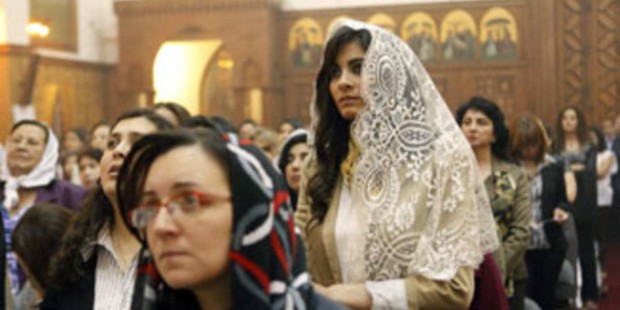 The refusal of the Coptic Orthodox Church to accept the request submitted by a number Coptic citizens to be excluded from the membership of the church raised a state of controversy over the influence of the church on the lives of its people in Egypt. The request came due to the refusal of the church to provide them with the right of the second marriage.
The refusal of the Coptic Orthodox Church to accept the request submitted by a number Coptic citizens to be excluded from the membership of the church raised a state of controversy over the influence of the church on the lives of its people in Egypt. The request came due to the refusal of the church to provide them with the right of the second marriage.
Egypt’s Administrative Court decided on March 25 to delay the lawsuit filed by Coptic citizen Ashraf Anis, to withdraw his membership from the church, to April 22 to allow conflicting parties to provide the required documents, reported Al-Masry Al-Youm.
Withdrawal from the church
Anis told The Cairo Post on Tuesday, “We submitted resignations from the membership of the Coptic Church to pave the way for implementing the rules of Islamic Sharia regarding our personal status, but the church refused to accept this resignation. I turned to the Administrative Court to cancel the negative decision taken by the church not to accept our resignation.”
He added that the representative of the church expressed the refusal of the Christian institution to the step during the hearing sessions, describing it as negligible step. He added, “The church works to implement its religious convictions by the force of law depending on Article 3 of Egypt’s constitution.”
The Coptic Church refuses to provide Copts who won judicial verdicts to divorce with licenses for a second marriage. It believes that divorce in Christianity is limited to adultery becasue of its interpreation of the Bible.
Pastor Rewis Oweida, secretary of Coptic Clerical Council, said that a number of Copts who want to gain the right of second marriage turn to the courts to withdraw their membership from the church.
He added that they turn to the courts to force the government to deal with them as Christian citizens who are not affiliated with any church allow a ruling by Islamic Sharia in their cases.
“The problem is not with the church,” he said, “but it is a legislative problem. The Egyptian law does not allow civil marriage among Egyptians. It is allowed only for the Egyptians who marry foreigners.” Marriage contracts are only provided by relicous clerics, whether the marriage is religious or a civil contract. Marriage contracts with a foreigner, however, can be provided the state.
The Clerical Council, headed by the Coptic Patriarch, is to consider the cases related to the personal status of Copts and whether to grant them the right to remarry or not. Anumber of members of the Holy Synod that is composed of the bishops and metropolitans of the Coptic Church are seated in the council.
Article 3 dilemma
“The church insisted on Article 3 of Egypt’s constitution to keep its control on the personal status of the Copts on one hand and to protect the clerics who manipulate the marriage contracts on the other hand,” Anis added.
Article 3 of Egypt’s constitution stipulates “The principles of Christian and Jewish Sharia are the main source of legislations related to their respective personal status, religious affairs and selection of spiritual leaders.”
Coptic intellectual Kamal Ghobrial criticized Article 3 of Egypt’s constitution, describing it as one of the main negative sides of the new constitution. “It undermines the rights of Copts as citizens, while it provides the church with the power to control their lives and destiny,” he said.
He told The Cairo Post on Tuesday that the church insisted on keeping this article to control personal status of Copts, adding that the approach adopted by the church in this case violates the Copts’ right to marriage that is one of the main human rights.
The Coptic intellectual condemned attempts adopted by Christian clerics to increase their power at the expense of the rights of the Christian citizens. He said that they work to strengthen their relations with the consecutive regimes in Egypt to keep their social prestige. He described such a process as the conspiracy between the state and the church against the Coptic citizen.
Regulations conflict
On the other hand, Anis said, “We organized a large number of demonstrations before the Ministry of Justice in 2008 in a protest against the amendment of 1938 Regulation of Personal status of Copts, without any response from the government.” He clarified that the government passed the new regulation drafted by the church without the approval of the People’s Assembly in a clear contradiction to the law.
1938 Regulation for Copts’ Personal Status gave nine reasons for divorce in Christianity, including the long absence of one of the spouses, sexual attack, insanity or infectious disease, adultery and converting from Christianity. However, the Coptic Church turned to amend the regulation to limit the reasons of divorce among the Copts to only adultery.
Oweida said, “Pope Shenouda III amended 1938 Regulation to meet the teachings of the Bible.” He added that the Coptic Church is committed to these teachings, stressing that it is not logic to violate them for the sake of any one.
He denied what was published over the intention of the church to amend the current regulation of the personal status.



